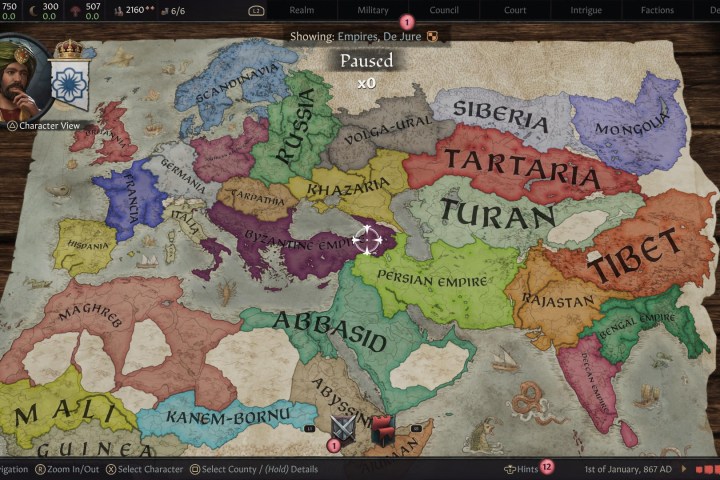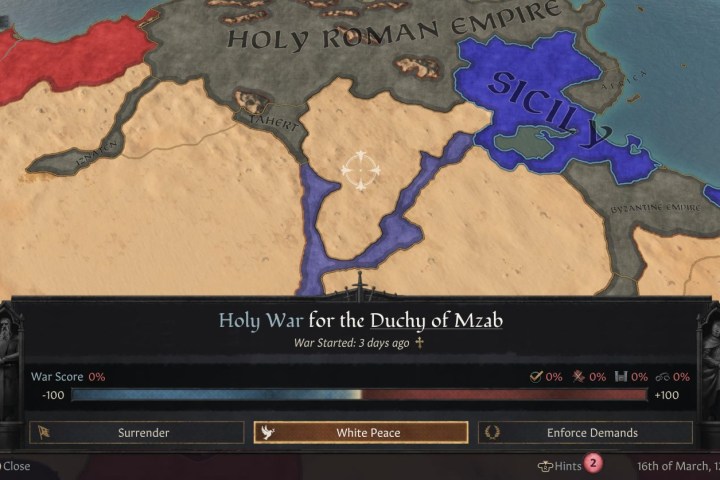Declaring and winning wars is the only way to grow your empire in Crusader Kings III. The larger your lands, the bigger your army. The bigger your army, the more lands you can conquer. You’ll repeat this song and dance, beginning as a lowly count in a far-off land and ascending to the emperor’s throne in a few hundred years. Still, your armies are only as good as their commander (and we don’t mean the NPC who’s actually in charge of them).
To win wars in Crusader Kings III, you must consider several minor details before ever raising your armies. If you’re struggling with world domination, you may be missing a few of these preliminary steps to warfare. Let’s dive into how to win wars in Crusader Kings III and all the pre-war steps you should take to give yourself an edge on the battlefield.
- The best starting characters in Crusader Kings III
- Crusader Kings III beginner’s guide: 10 tips and tricks to get started
- The best PS5 exclusives
Preparing for war

Before declaring war in Crusader Kings III, you have to obtain a Casus Belli or a legal reason/claim on that ruler’s land. The easiest way to obtain these, especially in the beginning, is by having your religious leader use their Fabricate Claim task on the county you want. This, however, costs gold once they finish. If you can’t afford it (and don’t want to go into debt), they can start the task over, allowing you to accumulate more wealth.
If you can afford it, go forward with the claim fabrication. Then, have your religious leader use Fabricate Claim on the neighboring county, effectively killing two birds with one stone while you declare war on the first county.
Alternatively, you can scroll through claimants when selecting a Dutchy, Kingdom, or Empire to see who in the world holds a claim on that land. If you convince them to join your court, you can push their claim. However, winning installs them as the holder of that land.
Once you assume control of a Duchy, Kingdom, or Empire, you can declare war on rulers who still hold land in that domain. If they’re an independent ruler, you can offer to become their liege. You can always declare war on them if they’re not into that.
Finally, you can declare Holy Wars on hostile religions, even taking control of an entire Kingdom if you have the army and piety. However, you can only declare a Holy War on a whole Kingdom once per lifetime.
You’ll encounter a few other Casus Bellis by leaving up different skill trees. However, those mentioned before are the most common.
Understanding war outcomes

Sometimes, you may have a few different Casus Bellis you can push. That’s why it’s important to understand your war objectives and the different outcomes of war. For example, in the image above, we have a claim on the County of Alencon, currently controlled by King Charles of West Francia. Obviously, his army is superior to ours, so we’d never declare this war. However, if the tables were turned, our character would gain control of the county. Then, we could give it to a Vassal or keep it as part of our domain. You’ll find that information under Outcomes in the bottom-right of your Declare War screen.

When you push other people’s claims, they gain control of the contested land. If their new title is lower than yours, they become your Vassal. If it’s higher, they become independent (which you never want). You gain a hook on them and some renown at best, but it’s not worth the time and gold investment if you’re not getting a new vassal or control of the land itself.
Save your game!
Perhaps the quickest yet most important tip of all when declaring war: Always save before you start the war. Random events can completely derail your conquest. Sometimes, the AI forms alliances mid-war, suddenly boosting their lousy army to an unstoppable machine. You won’t notice until it’s too late, and by then, your armies are probably crushed. If this happens, you can always reload your save (before you declared the war) and make a new plan.
Even if things go completely sideways or you die halfway through, saving and reloading will save you some severe headaches. There’s no shame in going back in time, especially in a single-player game. If you’re playing online or on ironman mode, you’ll have to commit to your choices.
Research your opponent

Sometimes you can crush somebody in Crusader Kings III. Other times, you’ll come up against someone with similar military strength to yours. You never want to declare war on someone with a bigger army. However, you may still be hesitant to fight someone on your level. Here’s where research comes into play and why it’s crucial to winning wars in Crusader Kings III.
Before you declare war on someone of similar strength, you should look at:
- Their Men at Arms
- Their Allies
- Your Allies
Counter Men at Arms regiments
To view an enemy’s Men at Arms, select their character and hover over the Army icon (it’s right underneath their faith). Here, you’ll see which Men at Arms regiments they have and how you can organize yours to counter them. Think of them like rock, paper, scissors.

Unfortunately, the counters are a little convoluted. Every culture has different names for its Men at Arms regiments. You have to go by the type, not the name. So here’s a general breakdown of Emperor Damiano’s Men at Arms (pictured above) and how we’ll counter them.
- 300 Cataphracts = Heavy Cavalry
- 200 Light Horsemen = Light Cavalry
- 100 Armored Footmen = Heavy Infantry
- 10 Mangonels – Siege Weapons
- 10 Trebuchets = Siege Weapons
In the Men at Arms screen, you’ll see which type counters which. So, if we were to build counter regiments, we’d enlist:
- 500 Pikemen (Spearmen) to counter Light and Heavy Cavalry
- 100 Light Footmen (Skirmishers) to counter Heavy Infantry

As for the Siege weapons, there’s nothing you can do to counter those aside from upgrading your castles to increase their fort level. You can tell a holding’s fort level by selecting it and looking at your current castle. In the image above, Messina has a fort level of 14, which will fend off Damiano’s Mangonels but fall to his trebuchets.
The best way to increase your fort level is by upgrading the castle itself. However, you can also invest in buildings like Forest Forts or Walls and Towers. If all your holdings have fort levels that exceed the capabilities of their siege weapons, they’ll have a hard time taking control of your land, thus losing the war. On the other hand, look at their fort levels to see if your siege weapons stand a chance. You don’t need siege weapons, but you’ll win wars in Crusader Kings III with them.
Check on allies
Forming alliances is crucial to winning wars in Crusader Kings III. However, your opponents form alliances too. You have to keep tabs on who’s got their back versus who’s got yours. Alliances factor into the total military strength depicted on the Declare War screen. To view alliances on both sides, select Allies.
The effectiveness of allies depends on if they’re fighting their own wars. When an ally is at war, they’ll still agree to help but in a limited capacity. Before declaring war, pause time and check to see if your allies are at peace. You’ll see their status right under their army and domain size.
Now is not a good time to call on them if they’re at war. On the flip side, if your opponent’s allies are at war (and yours are at peace), now’s an ideal time to declare war. If your opponent and their allies are already at war, now’s the perfect time to wage one of your own.
Finally, you can render an opponent’s allies useless by forming your own alliances with them. Allies won’t attack allies.
Here’s a quick anecdotal example: During our conquest of Italy, we kept getting crushed by The Pope. But it was like taking Rome from a baby when we waited for him to go on multi-year crusades. Strike when the time is right for easy wins.
Set rally points
Don’t overlook the usefulness of your rally points in Crusader Kings III. When you set custom rally points, you can raise your entire army from any location within your realm. This makes traversing land much faster (and the sea much cheaper). To set a rally point:
- Open the Military tab.
- Scroll down to Rally points.
- Either create a new one or move an existing one to a more strategic position.
If you don’t manually raise your army at a rally point, they’ll automatically raise in your realm capital. Consider this when you hold land closer to the county you’re looking to take. We have two rally points set in the image below: One in Messina (red) and one in Lecce (green). If we were going after the County of Avlonas, on the west coast of the Byzantine Empire, it would make more sense to raise the initial army in Lecce than in Messina.

Automated or manual war: Which should you use?
On console, Crusader Kings III players are slightly handcuffed regarding how much control they have over their armies. It’s harder to select and maneuver your armies, making manual control less attractive in large-scale battles. So, after you’ve declared war in Crusader Kings III, should you set your army to run automatically, or should you take command yourself?
We’ve let the AI control our armies 95% of the time and rarely run into problems. Of course, we’re always saving before each war if things go sideways. Sometimes, especially during more significant battles, you’ll need to “nudge” the AI by quickly switching between manual and automatic.
When fighting small-scale wars against neighboring rulers, it’s occasionally better to manually control your army. Here’s why:
On automatic, the AI raises your entire army. You don’t need all 10,000 troops to conquer a single country with 1,500 soldiers. Maintaining large armies gets expensive and is one of the downsides to automatic control. Instead:
- Set the control to Manual, raise your entire army, and pause time.
- Split off unneeded soldiers by selecting the army, pressing Square, and then selecting Split off hired soldiers and special soldiers.
- Split off all your Men at Arms regiments, as you don’t need them when you can overpower an opponent.
- Select Disband army to send them home.

Look at how much gold we’re saving by splitting them off! Almost 15 gold! You always want to keep your gold in the green to win wars in Crusader Kings III. It costs money to travel across the sea, so distant, drawn-out battles can leave you in serious debt. As long as you maintain a positive income, you should be good to go.
Invest in the War Profiteer stewardship perk to increase your monthly income by 10% during wartime. You only need two perk points to do so, and the first one must be Golden Obligations, which lets you demand payment for hooks. During wartime, have your Spymaster hunt for secrets in high-probability courts. With Golden Obligations, you can keep demanding payments to bolster your gold while already making 10% more with War Profiteer. For added effectiveness, spend one more stewardship point on Tax Man to boost Collect Taxes by 25%.
If you insist on leaving your game on automatic, you’ll have to keep disbanding the armies you don’t need whenever the AI brings them back. A small box showing the army commander appears in the bottom-left corner when they rise again. You’ll also hear a distinct audio cue. Press Square to select the army and disband them again. This gets annoying, but it’s the only way to save money when letting the AI control your army.
Understanding the war score

To win wars in Crusader Kings III, you have to accumulate a 100 war score. Then, you can enforce your demands and end the conflict. To check the war score, use the left and right bumpers to scroll between the items at the bottom of your screen (schemes, construction, armies, etc.).
The war score breaks down into four categories:
- Held objectives
- Battles won/lost
- Occupied holdings
- Prisoners taken
Holding objectives
For the attacker, held objectives are the holdings your army has successfully sieged and now occupies. It slowly ticks up the longer you keep those areas. For the defender, held objectives are the holdings within your realm that the attacker has trouble taking. For example, if your fort level is significantly higher than their siege weapon’s capabilities, you’ll earn a positive war score.
For example, we defeated a peasant uprising without fighting a single battle. Our forts were strong enough, and we eventually won the war on held objectives alone.
Winning battles
As you win battles, you gain a war score; it’s pretty simple. However, if you lose battles, you lose the war score. Even if you’re crushing it in other areas, you’ll take a step back if a small part of your army gets beaten. Two armies must enter the same barony (subsection of a county) to initiate a battle. Whoever was there first gets a defender bonus, but that doesn’t matter when your army is significantly bigger than theirs.
Sieging castles
The fastest way to win a war is by occupying lands and besieging holdings. Sieges take time, so either fast forward through a winnable war or watch your armies when your opponent is evenly matched.
Don’t release prisoners!
Finally, taking high-value prisoners adds to your war score. You capture prisoners whenever you win battles or take holdings. If you grab the enemy leader, you can win the war automatically. However, you can’t release or ransom prisoners during the war, or else you’ll lose the war score. The ransom gold may be tempting, but it’s not worth the money you’ll lose as the war advances.
Post-war strategies
Once you’ve enforced your demands, the war ends. You gain control of the new lands to do as you wish. That, or someone takes over for you and becomes your Vassal. Now what?
After winning wars in Crusader Kings III, the first thing you should do is set your Marshal to Increase Control in a County. Counties with low control produce less gold and levies. In most cases, you’ll be taking lands of different cultures and faiths. Because you’re different, the people there won’t like you.
While increasing control, you’ll also want to set your Steward to Collect Taxes and your Spouse to Manage Domain (increases Stewardship). War is expensive, so you’ll want to make that money back before declaring the next one.
People inside your realm also don’t like going to war. If you declare too many back-to-back offensive wars, your popularity within counties will decrease. If it drops too much, you could have a peasant uprising on your hands. You may also fall victim to Vassal factions working against you.
Once the war ends, you’ll enter a truce with that person. While you can declare war on them again, you’ll lose 250 prestige, a level of fame, and gain the Broken Truce trait for three years. Broken Truce decreases your general opinion by 50 points. It’s probably not worth your entire realm hating you just to go back to war. Instead, consider murder.
Truces only exist between rulers, not realms. If something were to “happen” to the enemy ruler, the truce goes away, and you could declare war again without penalty. Alternatively, a strong Chancellor can end truces early, but this is up to RNGs. You can see how long a truce will last by opening your Military tab and scrolling down to Alliances and truces. After enforcing our demands in the image above, we entered into a five-year truce (that we can’t control).
If your character is a savvy diplomat, you can invest in the Flexible Truces perk, which shortens truces and negates the prestige penalty. People will still hate you, but you won’t lose much else.




